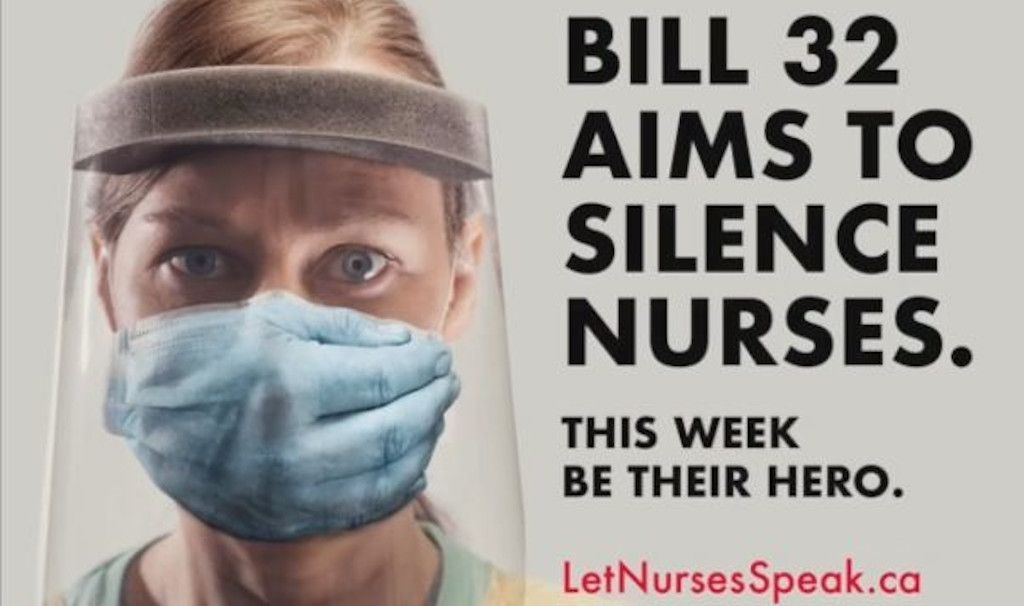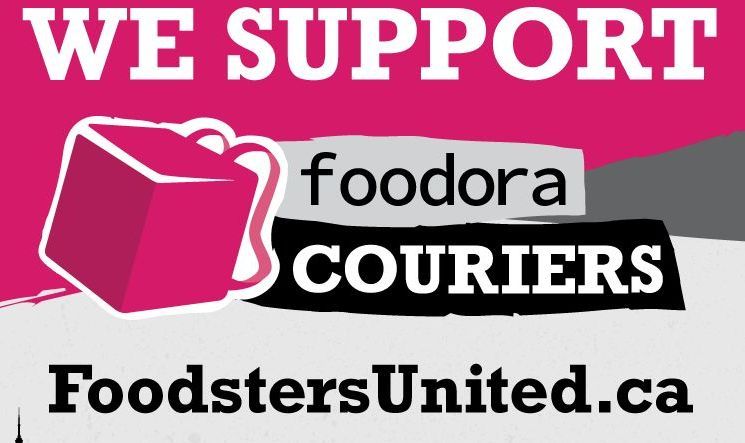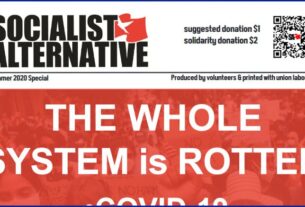Alberta’s Bill 32: Unprecedented escalation of Kenney’s war on workers
There’s a good general rule for whether a piece of legislation will help or harm working people. If the business community says that it will lead to an economic Armageddon, workers probably stand to benefit (at the expense of their profits). But if the bosses like what the government is planning, it’s almost guaranteed to be bad news for the rest of us.
And a whole lot of bosses in Alberta love the ruling United Conservative Party’s proposed Bill 32, introduced by the province’s Labour and Immigration Minister, Jason Copping, on July 7. The omnibus bill, falsely titled the Restoring Balance in Alberta’s Workplaces Act, is aimed at reversing the modest legislative gains made by workers during the 2014–18 New Democratic Party administration of Rachel Notley (though those advances still left Albertans with some of the weakest workplace protections in the country), but it hardly stops there.
Currently scheduled to come into effect on August 15 if it is enacted, Bill 32 is a full assault on workers in Alberta. This is well in keeping with Premier Jason Kenney’s previous attacks, especially his funding cut and layoff of 25,000 education workers in March and his government’s Bill 1 – which criminalizes public protest under the guise of “defending critical infrastructure” – which was passed in May. This newest offensive is a broad and hugely ambitious one, and it’s imperative that workers and socialists resist it with every means at our disposal.
What does Bill 32 do?
With dozens of changes to the Employment Standards Code, the Labour Relations Code, and other laws crammed into this omnibus bill, it’s difficult to know where to begin to break down its features, which are regressive without exception. We can start with the most basic and fundamental way that workers have to protect ourselves from the bosses: unions.
In the province with already the lowest union density rate in the country (24.6 percent in 2019 and a national rate of 30.2 percent), the UCP is trying to make it harder for workers to form or join a union, and easier for employers to delay or altogether avoid one. A union can now be denied official recognition by the government if, during a certification drive, it is adjudged by the province’s labour board to have conducted “certain prohibited practices” – a catch-all if ever there was one. The union will also then be barred from further trying to organize that workplace for six months. This is an “open season” declaration by the government that, while employers will continue to be able to engage in dirty tricks, lies, and intimidation to dissuade employees from voting to unionize, a union for its part will have to fight with two hands and one leg tied behind its back. Further, if employees at a workplace are able to trigger a certification vote, it could take weeks or months for it to be held: instead of the previous requirement of five working days, this vote will now happen “as soon as possible,” leaving “possible” open to all manner of interpretations by the employer and the labour board.
But let us say that a dedicated group of workers has succeeded in soldiering through the delays and navigating the land mines laid for them by their employer and the government and have successfully organized their workplace. Kenney, Copping, and the UCP have plenty of other nasty surprises lined up for them at this stage too. If they vote to go on strike, they will be barred from placing any impediment at all upon replacement workers (scabs) that the boss might hire to do their jobs during the strike. Even stepping in front of these to try to talk to them and convince them not to cross the picket line could result in fines or jail for the striking workers or their union representatives. These workers would also have to apply for government permission in order to, say, picket in front of a different business owned by the same employer. One could easily see these new caveats working in conjunction with the “sidewalk clause” of the already-passed Bill 1, in which land defenders, protestors, or strikers could be deemed as unlawfully blocking infrastructure whether they are on a highway, a sidewalk nearby, or even literally beside the road in a ditch. And if the strike is deemed in any way “unlawful,” the government can suspend dues payments to the union as well.
This defunding threat pairs well with perhaps the most headline-grabbing part of the bill, and certainly the part that Kenney is trying to make into its biggest talking-point. “Bill 32 means the dues of unionized workers will no longer be forcibly used to fund the political campaigns of union bosses,” the premier tweeted on July 13, in an attempt to paint an attack on the finances of his political opponents as a blow struck for workers’ freedom. This, of course, totally distorts the way a union operates, in which workers democratically choose their representatives and course of unified action (even though this ideal is of course not always fully realized). It also bears pointing out, incidentally, that the freedom-loving Kenney is giving Albertans as a whole no such option to decline to pay for the oil lobby war room his government infamously set up upon the UCP’s election in 2018, nor has he acted to similarly restrict big business’s ability to spend millions to advocate on behalf of his party and policies.
Bill 32 also proposes changes to the construction industry, making the switch to a better union in that sector less appealing by having old collective agreements automatically apply to the new union for their original duration. While Socialist Alternative is against union raiding in most circumstances (because we believe that energy would be better spent organizing non-unionized workers), there are times when a unit of workers have good reason to want new and tougher representation. For example, if the workers at a site chose to switch their affiliation from the employer-friendly, scab union, Christian Labour Association of Canada (which has not spoken against the bill and stands to benefit from it) and join a real union such as Unite Here or the United Brotherhood of Carpenters, Bill 32 would keep these workers stuck with the subpar contract left by the old union.
All workers are under attack
As for the three-quarters of Alberta workers outside of a union and not covered by a collective agreement, they and unionized Alberta workers still share much to fear from this bill. Many Albertans rely on overtime pay to make ends meet. The UCP is continuing their prior attacks on overtime by giving bosses the power to unilaterally impose overtime “averaging agreements” upon workers. As implied by the word “agreement,” this currently requires the consent of the employee, who may not want to give up overtime pay in the interest of what is still one of capital’s favourite buzzwords: “flexibility.” Under Bill 32, the worker will not only be stripped of that right with the new “averaging arrangement,” but the timeframe for the overtime-averaging will be stretched from an already-long 12 weeks to an absurd 52 weeks – in effect, this means that overtime pay will now completely vanish for thousands of workers.
However, for those concerned about the slashing of overtime pay making it hard to pay the rent or mortgage, the UCP has given an option: send the kids to work. One of the bill’s most egregious provisions is an increase in “flexibility” in the hiring of 13- and 14-year-olds, whom employers can now put to work as janitors, fry cooks, and a host of other jobs without applying for special dispensation. (This is after the government cut the minimum wage for students under the age of 18 in June of last year, and after Kenney last month refused to promise that he wouldn’t cut the minimum wage for all workers.)
There are almost countless other measures in the bill which punish workers and reward bosses, each of which could warrant an article on its own: employers can now wait up to a month to pay severance after a termination (up from three days); break times are becoming more “flexible;” bosses can further tinker with dates to reduce statutory holiday pay; employers would not need to give group termination notice to employees or unions; and employer violations of any of these “would still [result in] a penalty, but the amount could be adjusted on a case-by-case basis and employers will have more time to make the payment.”
Alberta bosses rejoice, while others plan
Big business, whose profits and political power will both be hugely bolstered by Bill 32, and their employer associations are thrilled with what they see as another sure victory for them and their bottom lines won alongside their friends in the UCP. “I applaud Jason Copping… and Grant Hunter, associate minister of red tape reduction, for the common sense approach that the government has taken,” said Peter Tzanetakis, president of the Canadian Payroll Association. The Alberta Construction Association’s chair Frederick Vine was similarly happy, loving the bill’s promise of “greater flexibility and reduced red tape in averaging agreements, hours of work, and temporary layoffs.” These words should give considerable pause to even workers who don’t feel a connection to their own unions and see them as simply means to cut cheques for NDP election ads.
Leaders of big business and their loyal politicians in other provinces will be waiting eagerly to see the reaction to Kenney’s latest moves in Alberta. Doug Ford in Ontario, Brian Pallister in Manitoba, Scott Moe next door in Saskatchewan, and others nationwide will be eager to line up their own attacks on workers while they have the opportunity. The window may indeed be a narrow one, as the shock of pandemic wears off and anger begins to flare (Moe also has an election coming in the fall). Right-wing provincial governments across Canada may decide that this is their best chance, before that anger has had a chance to coalesce around organized structures and popular, democratically-agreed demands that the working class not be forced to pay for an economic crisis they had no hand in creating.
How will unions fight back?
Bill 32 is full of U.S. Republican Party-level attacks on workers’ rights, of which the most right-wing U.S. governors would be proud. The leaders of Alberta’s unions have for a long time been very hesitant to significantly mobilize their memberships to fight against attacks and cuts – most recently the aforementioned Bill 1, mass education firings, and huge COVID-19 outbreaks at meat-packing plants in the towns of High River and Brooks. CUPE Alberta simply stated, “Bill 32 is union busting. Mr. Kenney, we will see you in court,” without any calls for strikes or protests. This follows the Alberta Union of Public Employees (AUPE) suing the government over the constitutionality of Bill 1. Albertans continue to stage protests over that legislation even though it was voted through in May and became law on June 17.
Union leaders have spoken at rallies and written op-eds, but so far they have not organized significant turnout to those protests nor called for militant strike action. Included in this criticism can be the United Food and Commercial Workers union, who allowed the reopening of the Cargill High River plant which was the site of the single largest outbreak of COVID–19 in the country, and also undercut its Safeway grocery workers’ strike vote by making clear that the vote was merely for leverage in negotiations.
This is a battle that Alberta labour must fight with more than just lawyers. And it’s one that must not be fought by Albertans alone – if they’re successful here, capitalists will try to implement similar laws in every province and territory they can, and even federally if possible. Justin Trudeau is of course no ally in this fight, and has not spoken out against the premier with whom he engaged in debate theatrics when Kenney was a Member of Parliament. But, inexcusably, federal NDP leader Jagmeet Singh has also been silent. Singh, Notley, and the other leaders of Canada’s left and labour movements must steel workers in Alberta – many of whom are very willing to fight – for a hard struggle and provide the resources and back-up that will be necessary for workers who disobey and organize against the UCP’s new laws. There have been encouraging signs of this from some union leaders in the wake of this bill, such as Alberta Federation of Labour president Gil McGowan, who said, “We will fight on the political stage; we will fight in the courts; and if necessary, we will fight in the street.” AUPE says that there is a battle looming, “a significant struggle like we’ve never seen in this province.” They are gearing their members for a strike, saying that they’ve had rallies and information pickets but that “they don’t directly challenge the power structure. Workers withdrawing their labour will be the only power that’s going to have any influence. . . . at the end of the day, that’s not going to force the government to back down. It will only be through the collective power of workers taking strong action.”
On-the-ground organizing in the streets and the workplaces are indeed necessary to build confidence and structure, all the way to a one-day general strike if necessary.
Copping claims that he is trying to exorcise the spectre of the New Democrats with Bill 32: “Significant changes were made under the previous government that pushed the balance towards the union side. We needed to make some changes to restore that balance. This legislation does a lot of that.” The bill, however, is a further confirmation that there is indeed no “balance” possible in the fundamentally unequal and exploitative capitalist relationship between employer and employed. This move by the ruling class and their politicians is a particularly brutal effort to tilt the balance even more lopsidedly in their favour. A blow dealt back by workers, and the defeat of Bill 32, would be a huge and galvanizing victory for workers in Alberta and across the country.



